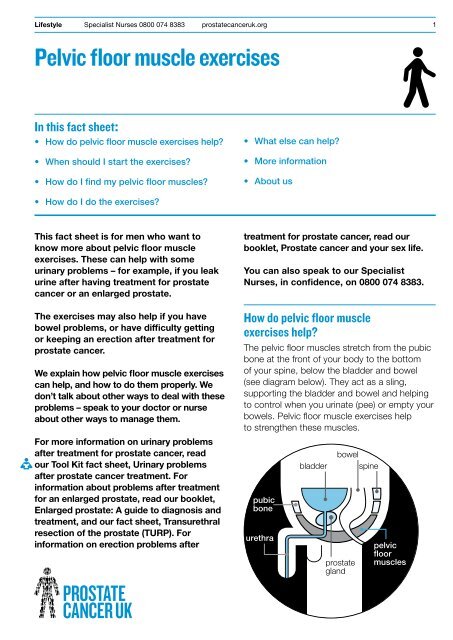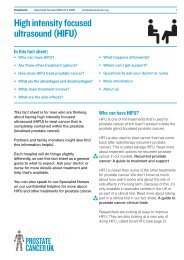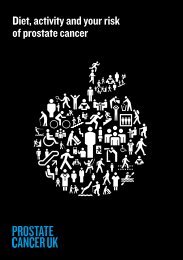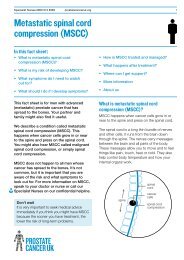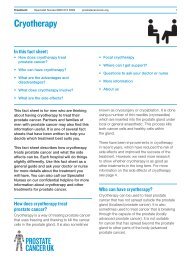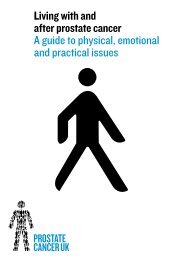Pelvic floor muscle exercises - Prostate Cancer Charity
Pelvic floor muscle exercises - Prostate Cancer Charity
Pelvic floor muscle exercises - Prostate Cancer Charity
- No tags were found...
Create successful ePaper yourself
Turn your PDF publications into a flip-book with our unique Google optimized e-Paper software.
Lifestyle Specialist Nurses 0800 074 8383 prostatecanceruk.org<strong>Pelvic</strong> Floor Muscles<strong>Pelvic</strong> <strong>floor</strong> <strong>muscle</strong> <strong>exercises</strong>21In this fact sheet:• How do pelvic <strong>floor</strong> <strong>muscle</strong> <strong>exercises</strong> help?• When should I start the <strong>exercises</strong>?• How do I find my pelvic <strong>floor</strong> <strong>muscle</strong>s?• What else can help?• More information• About us• How do I do the <strong>exercises</strong>?This fact sheet is for men who want toknow more about pelvic <strong>floor</strong> <strong>muscle</strong><strong>exercises</strong>. These can help with someurinary problems – for example, if you leakurine after having treatment for prostatecancer or an enlarged prostate.The <strong>exercises</strong> may also help if you havebowel problems, or have difficulty gettingor keeping an erection after treatment forprostate cancer.We explain how pelvic <strong>floor</strong> <strong>muscle</strong> <strong>exercises</strong>can help, and how to do them properly. Wedon’t talk about other ways to deal with theseproblems – speak to your doctor or nurseabout other ways to manage them.For more information on urinary problemsafter treatment for prostate cancer, readour Tool Kit fact sheet, Urinary problemsafter prostate cancer treatment. Forinformation about problems after treatmentfor an enlarged prostate, read our booklet,Enlarged prostate: A guide to diagnosis andtreatment, and our fact sheet, Transurethralresection of the prostate (TURP). Forinformation on erection problems aftertreatment for prostate cancer, read ourbooklet, <strong>Prostate</strong> cancer and your sex life.You can also speak to our SpecialistNurses, in confidence, on 0800 074 8383.How do pelvic <strong>floor</strong> <strong>muscle</strong><strong>exercises</strong> help?The pelvic <strong>floor</strong> <strong>muscle</strong>s stretch from the pubicbone at the front of your body to the bottomof your spine, below the bladder and bowel(see diagram below). They act as a sling,supporting the bladder and bowel and helpingto control when you urinate (pee) or empty yourbowels. <strong>Pelvic</strong> <strong>floor</strong> <strong>muscle</strong> <strong>exercises</strong> helpto strengthen these <strong>muscle</strong>s.pubicboneurethrabladderbowelspineprostateglandpelvic<strong>floor</strong><strong>muscle</strong>s
Lifestyle Specialist Nurses 0800 074 8383 prostatecanceruk.org43How do I find my pelvic <strong>floor</strong> <strong>muscle</strong>s?It’s important to find the right <strong>muscle</strong>s before youstart doing pelvic <strong>floor</strong> <strong>muscle</strong> <strong>exercises</strong>. To dothis, either sit, stand or lie down – whichever youfind most comfortable – and relax your thighsand buttocks.• Tighten the ring of <strong>muscle</strong> around the openingto your back passage (anus) as if you’re tryingto control wind. Then relax. Try not to squeezeyour buttocks together, or tighten your thigh<strong>muscle</strong>s or stomach (abdominal) <strong>muscle</strong>s.And try not to hold your breath – just keepbreathing normally.• At the same time, imagine you’re urinatingand tighten your <strong>muscle</strong>s as if you’re tryingto stop mid-flow, then relax. You can try thisonce or twice while you’re actually urinatingif this helps you to find the right <strong>muscle</strong>s –but don’t do this all the time as it couldcause problems emptying your bladder.• If you’re tightening the right <strong>muscle</strong>s, youshould feel a dip at the base of your penisand feel your scrotum (the skin around thetesticles) move up a little. You might find ithelpful to do the <strong>exercises</strong> in front of a mirrorto begin with, so you can see the base ofyour penis and your scrotum move.• You can also check if you’re using the right<strong>muscle</strong>s by touching the skin just behind thescrotum. You should feel the <strong>muscle</strong>s lift upand away from your fingers when you tightenthem. If you feel the <strong>muscle</strong>s pushing down,you aren’t doing the <strong>exercises</strong> properly.How do I do the <strong>exercises</strong>?Make sure you’ve found the right <strong>muscle</strong>s,and know how it should feel when you tightenthem, before trying these <strong>exercises</strong>. There aretwo sets of <strong>exercises</strong> – slow and fast. You cando them while sitting, standing or lying down –whichever you prefer.Slow pelvic <strong>floor</strong> <strong>muscle</strong> <strong>exercises</strong>1. Slowly tighten the <strong>muscle</strong>s as hard as youcan so you feel a lifting sensation.2. Try to hold this lift for ten seconds. Keepbreathing normally.3. Slowly relax the <strong>muscle</strong>s and rest forten seconds.4. Aim to repeat the lift and rest up to ten times.You might find that you can’t hold the lift for tenseconds to start with. Just hold it for as longas you can and try to build up to ten seconds.It’s more important to do the <strong>exercises</strong> properlythan to do them for the full ten seconds.Fast pelvic <strong>floor</strong> <strong>muscle</strong> <strong>exercises</strong>1. Repeat the same action, but this time trytightening the <strong>muscle</strong>s as quickly as possible.2. Hold the lift for one second and then let go.3. Try to do up to ten of these short, fast lifts.Try to concentrate while you’re doing the<strong>exercises</strong>. If you don’t do them properly,they might not help.If you’d like more advice on how to do pelvic<strong>floor</strong> <strong>muscle</strong> <strong>exercises</strong>, or you’re finding themdifficult, ask your doctor, nurse or GP to referyou to a continence advisor or specialistcontinence physiotherapist. They specialise inproblems with leaking urine and can help youwith the <strong>exercises</strong>.
Lifestyle Specialist Nurses 0800 074 8383 prostatecanceruk.org 6More informationBladder and Bowel Foundationwww.bladderandbowelfoundation.orgHelpline: 0845 345 0165Information and support for all types of bladderand bowel problems.Chartered Physiotherapists PromotingContinence (CPPC)cppc.csp.org.ukFind details of private physiotherapists near youwho specialise in continence problems.Continence Product Advisorwww.continenceproductadvisor.orgUnbiased information on products fordifferent continence problems, writtenby health professionals.Disability Rights UKwww.disabilityrightsuk.orgTelephone: 0300 555 1525Practical information guides about disabilityrights and benefits. And keys for accessibletoilets across the UK.NHS Direct Waleswww.nhsdirect.wales.nhs.ukTelephone: 0845 46 47Provides health advice 24 hours a day,and lists local health services in Wales,including GPs.NHS Informwww.nhsinform.co.ukTelephone: 0800 22 44 88Provides health information and details of NHSand other support services in Scotland.nidirectwww.nidirect.gov.ukInformation about government services inNorthern Ireland, including health services.PromoCon (Promoting Continenceand Product Awareness)www.promocon.co.ukHelpline: 0161 607 8219Impartial information and advice about bladderand bowel problems.NHS Choiceswww.nhs.ukInformation about treatments, conditions andlifestyle, including healthy eating, physical activityand stopping smoking.
Lifestyle Specialist Nurses 0800 074 8383 prostatecanceruk.org7About us<strong>Prostate</strong> <strong>Cancer</strong> UK fights to help more mensurvive prostate cancer and enjoy a better life.This fact sheet is part of the Tool Kit. You canorder more Tool Kit fact sheets, including anA to Z of medical words, which explains someof the words and phrases used in this fact sheet.Download and order our fact sheetsand booklets from our website atprostatecanceruk.org/publicationsor call us on 0800 074 8383.At <strong>Prostate</strong> <strong>Cancer</strong> UK, we take great care toprovide up-to-date, unbiased and accurate factsabout prostate cancer. We hope these will addto the medical advice you have had and help youto make decisions. Our services are not intendedto replace advice from your doctor.References to sources of information used in theproduction of this fact sheet are available atprostatecanceruk.orgIt was reviewed by:• Declan Cahill, Consultant Urologist,Guy’s Hospital, London• Valerie Clarke, Site Lead Physiotherapist(<strong>Pelvic</strong> Floor Dysfunction), Royal AlexandraHospital, Paisley• Professor Grace Dorey MBE, ConsultantPhysiotherapist, Nuffield Hospital Taunton,Somerset• Elaine Hazell, Clinical Nurse Specialist,Guy’s Hospital, London• Lyn Kirkwood, Clinical Nurse Specialist(Urology, Continence and Stoma), WestonGeneral Hospital, Weston-Super-Mare• Diane Wootton, Clinical SpecialistPhysiotherapist, The Hillingdon HospitalsNHS Foundation Trust, Greater London• <strong>Prostate</strong> <strong>Cancer</strong> UK Volunteers• <strong>Prostate</strong> <strong>Cancer</strong> UK Specialist NursesTell us what you thinkIf you have any comments about ourpublications, you can email:literature@prostatecanceruk.orgThis publication was written and edited by:<strong>Prostate</strong> <strong>Cancer</strong> UK’s Information Team.
Speak to ourSpecialist Nurses0800 074 8383*prostatecanceruk.orgDonate today – help others like youDid you find this information useful? Would you like to help others in yoursituation access the facts they need? Every year, 40,000 men face a prostatecancer diagnosis. Thanks to our generous supporters, we offer informationfree to all who need it. If you would like to help us continue this service, pleaseconsider making a donation. Your gift could fund the following services:• £10 could buy a Tool Kit – a set of fact sheets, tailored to the needs of eachman with vital information on diagnosis, treatment and lifestyle.• £25 could give a man diagnosed with a prostate problem unlimited time totalk over treatment options with one of our Specialist Nurses.To make a donation of any amount, please call us on 0800 082 1616,visit prostatecanceruk.org/donations or text PROSTATE to 70004*.There are many other ways to support us. For more details please visitprostatecanceruk.org/get-involved**You can donate up to £10 via SMS and we will receive 100% of your donation.Texts are charged at your standard rate. For full terms and conditions and moreinformation, please visit prostatecanceruk.org/terms© <strong>Prostate</strong> <strong>Cancer</strong> UK June 2014To be reviewed June 2016Call our Specialist Nurses from Mon to Fri 9am - 6pm, Wed 10am - 8pm* Calls are recorded for training purposes only.Confidentiality is maintained between callers and <strong>Prostate</strong> <strong>Cancer</strong> UK.<strong>Prostate</strong> <strong>Cancer</strong> UK is a registered charity in England and Wales (1005541) and in Scotland (SC039332). Registered company number 2653887.2571 PEL/JUN14


